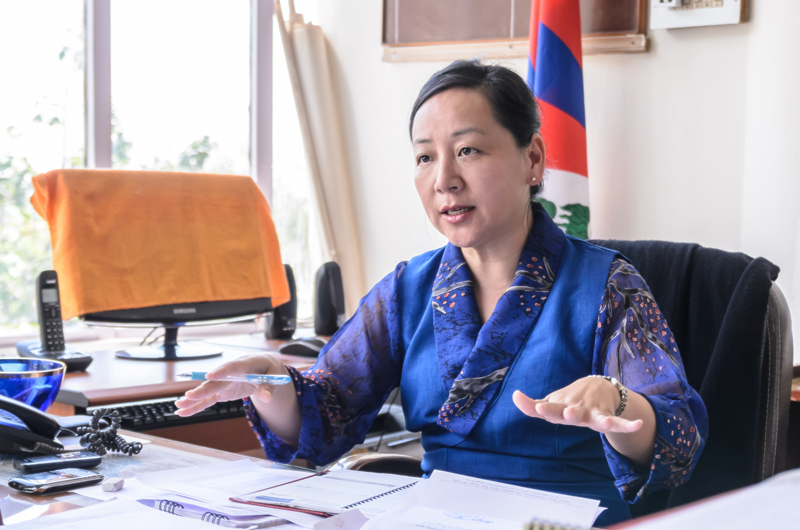
(TibetanReview.net, Mar09’16) – After resigning as Kalon (Minister) for Information and International Relations on Feb 28, citing her continuance on that post as a handicap to her freedom to participate in the debate under the ongoing Tibetan general election, Ms Dicki Chhoyang has on Mar 6 issued a statement, setting out a list of personal traits she felt were important in a person to be elected as the next Sikyong, or executive head of the exile Tibetan administration. The final voting for the election, which she has said is taking place at a critical juncture in Tibetan history, all the more because His Holiness the Dalai Lama is now 80 years old, is due on Mar 20. Below is her statement in full:
STATEMENT
Kasur Dicki Chhoyang
6 March 2016
On February 28, 2016, I resigned as Kalon of the Central Tibetan Administration so I could participate in the discussions leading up to the 20 March 2016 general election. I would not have been able to publicly express my personal opinions while serving as Kalon. My resignation does not stem from any external pressure and is unrelated to being included or not in the next Kashag. I remain fully committed to the Tibetan cause and the Central Tibetan Administration.
H.H. the Dalai Lama is 80-years-old and for his entire life he has worked for the benefit of Tibetans and continues to do so. We are blessed by his presence during this critical historical juncture, but great challenges are yet to come. We must be ready to face them. There is no time to be lost. The next Sikyong has a key role to play in ensuring this. The office of Sikyong is the highest honor bestowed by the Tibetan people upon one individual to serve as our political leader. Below are some personal character traits which I consider important for this person to have:
• Committed to the collective interest – A Sikyong should be a person whose motivation and dedication to the collective interest is beyond question.
• Someone who can think holistically and with a long-term vision.
• Honest – Who will tell the truth, answer questions directly and be transparent.
• A team player – A person who can bring the best in other people through collaboration, mutual support, guidance and encouragement.
• Value substance over appearance – Someone who will understand that having depth is more important than external appearance.
• Respectful of others – An individual who will give due credit to colleagues and those who served before him/her.
• Humble – To not be boastful and have the ability to recognize one’s knowledge and skills limitations, to consult with others and listen to advice.
• Confident – Have the confidence to stand on one’s own merit and not refer to praise from respected leaders like H.H. the Dalai Lama and Samdhong Rinpoche as a crutch to gain public trust and respect.
• Who can rise above regionalism – Someone who will rise above traditional sources of community tension such as regionalism and not exploit it for personal gain such as electoral votes.
I wish to speak further about this last point. While we have improved significantly compared to the past, the current electoral campaign season has strong regional overtones. This is destructive. We must teach our children to think of themselves as Tibetan first and exercise their democratic right and duty to vote based on issues and not regional identity. Let’s hope we can demonstrate greater collective maturity in 2021.
During this campaign season, the range of issues debated has been disappointing with their irrelevance to the current situation in Tibet and our political movement. We have a moral duty to prioritize issues touching the 98% of Tibetans living in Tibet. The self-immolations in Tibet and the recent death of 16-year-old student Dorjee Tsering in India and 18-year-old Kalsang Wangdu in Kanze are a heartbreaking reminder.
On 20 March 2016, Tibetans will go to the poll and exercise their collective duty and wisdom. I appeal to all Tibetans to take this responsibility seriously and make an informed choice on behalf of Tibetans inside Tibet. I am confident we can successfully face the challenges to come, but we must choose the right individual to lead us.
In closing, I wish to express my upmost respect for all staff members of the Central Tibetan Administration and especially the Department of Information and International Relations staff with whom I worked during the last 4½ years.
There is no doubt in my mind that the Central Tibetan Administration, under the right leadership, will represent and further the interest of Tibet and Tibetans.


